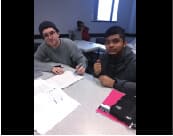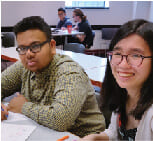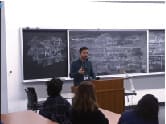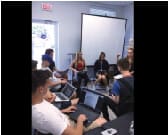Online Summer School Mississauga - Queen Elizabeth Academy
How can our Online Summer School help students to build foundations?
The challenge for many summer school courses is that they are self study based. For courses such as math, chemistry, physics, English, students have to be taught. This is the only way to ensure that they have the foundation going into the next year.
QE provides online credit courses with Live lessons. (not watching video). Our instructors are there to teach the course, just like in a classroom, with full interaction, asking questions period. We run a small class size with a maximum of 9 students, and we dedicate period for 1 on 1 time with the teacher, built into many of our classes.
We facilitate understanding, not memorizing. Our students are able to build foundations through a positive learning experience, fixing up their gaps, and understanding the concepts.
Online Summer School - Sample Live Lesson
Online Summer School - Benefits to Students
1. Live teaching
To build foundations on critical subjects such as English, Math, Physics and Chemistry, self study and watching YouTube videos is not sufficient. QEA provides live classes online - Students are properly taught. In our online class, students can ask questions and interact with our teacher, just like a regular in person class.
2. Proper lessons
When it comes to building foundations, students need to have proper lessons. What does this mean?
QEA teacher delivers a live lecture. During a lecture, students are free to ask questions just like in an in person class.
We take it a step further - on most of our live online lessons, we dedicate 1 on 1 time between teacher and student during class period, so that students can clarify any misconceptions right after the lecture.
This is important in facilitating their learning and understanding, especially on complex subjects such as math and physics.
3. Small Class Sizes - QEA Online Summer School
To maintain the quality of our online summer school, class size is limited to a maximum of 9 students. This gives our online summer school students the chance to ask questions throughout the ongoing lecture.
Students are no longer being placed in the corner. Rather, they are all active participants in a fully interactive, live lecture.
4. Facilitate understanding, not memorizing
When it comes to math, physics and chemistry, students tend to memorize equations and steps. This is not the preferred way of learning.
At QE online summer school, we facilitate understanding, not memorizing. What does it mean? When it comes to explanation, the QE teacher will explain the "why" behind a concept or the reasoning behind a step, therefore the student can understand the logic behind it.
This is critical to prepare them with a strong foundation preparing for the next grade or university. Teachers (professors) will not give the same question with different numbers. Students are expected to apply their concepts to changing situations. QE prepares our students for this.
5. Fully interactive
QEA online summer school is fully interactive. During our live lecture, students are free to ask questions. We have a dedicated class discussion period, where students are encouraged to participate and put forward their ideas and input. In most of our lessons, we have dedicated 1 on 1 time with the teacher built into classwork period, where students can clarify any misconceptions privately with the teacher.
QEA Online Summer School - Subjects available
Grade 12 Online Summer School
Advanced Functions | Chemistry 12 | Physics 12 | English 12
Grade 11 Online Summer School
Math 11 | English 11 | Chemistry 11 | Physics 11
Grade 10 Online Summer School
Math 10 | English 10
Grade 9 Online Summer School
Math 9 | English 9
QEA Online Summer School - what do parents and students say about us?
Emily H.
admitted to
Queen's Commerce
Jivan K.
admitted to
Waterloo Engineering
Stephanie L.
admitted to
Queen's Commerce
Andrew G.
admitted to
Western Engineering
Google Reviews
Queen Elizabeth Academy | Online Summer School
I credit QEA for my entry into Western Engineering! Tutors/Teachers actually teach and care about ensuring students fully grasp the learning, their online group learning format far exceeds that in the public school system, numerous additional resources were available to set me up for success, and the school is very well run and organized. Thank you QEA!read more
Queen Elizabeth Academy has been a crucial aspect of my education, consistently providing exceptional teaching throughout my high school math classes. I enrolled in both their Advanced Functions and Calculus & Vectors credit courses, with Cameron as my teacher. The quality of my education was outstanding, with Cameron's expertise and teaching style ensuring that the class understood every concept thoroughly.Additionally, I used QEA's private tutoring services in grade 10, where I worked with Amjad. These tutoring sessions were crucial in reinforcing my understanding of mathematical concepts and maintaining my academic performance.
Having just finished my first year at the University of Toronto (UTSG), I can confidently say that QEA prepared me excellently for higher levels of education. The foundation created by QEA's courses and tutoring services proved invaluable for my university-level Calculus & Linear Algebra course and other calculation-based classes such as Microeconomics and Finance.
I will continue to recommend Queen Elizabeth Academy to anyone seeking a high-quality math education! Whether for credit courses or private tutoring, QEA's commitment to exceptional teaching and their genuine care for each student is unparalleled.read more
Over the years, all of our four children have taken secondary school courses at Queen Elizabeth Academy. Victor is amazing! He and his team of educators and staff have always demonstrated a positive, communicative and supportive learning experience. In our most recent experience with the Advanced Functions and Calculus courses, our daughter’s teacher Cameron was absolutely fabulous! He made math enjoyable by adding a little bit of humor to his teaching and by encouraging the students to ask questions, while also patiently taking the time needed to ensure that everyone in the class understood the material being taught. Cameron assisted our daughter in catching up on the math concepts that had been missed (due to her grade 9/10/11 online / in-person pandemic experiences) and supported her in gaining a very in-depth understanding of Calculus in preparation for her university level math. We really couldn’t have asked for a better teacher than Cameron. Thanks to both Victor and Cameron for such a wonderful educational experience.read more
My daughter Megan has had the opportunity to take grade 11 math and grade 12 advanced functions at queen Elizabeth Academy. She is registered for physics 12 in the fall. Due to the pandemic situation we have been very worried that our child is not going to get the foundations in math and science that she needs. Thanks to Victor and his team of highly qualified teachers our concerns have been alleviated. Megan has had the traditional in class model with QEA and has just finished up with an online platform. Both have been great and I am confident that Megan is now prepared for university. I truly believe that the public school system of distance learning cannot do what Victor and his team have done for my daughter. She has been prepared for success as a direct result of professional teaching methods that work.read more
Tips to achieve higher grades on Online Summer School
Summary your own notes after each class
It is important for students to make their own study notes - to summarize their learning after each class. In your own words, summarize the concepts, types of problems and their way of solving it. These notes will become invaluable when it comes to tests and exams preparations
Dedicate time for homework
Although QEA online classes provide class time for homework, it is important for students to practice to build a good foundation. You should dedicate time after school to do homework. Practice makes perfect!
Maximize your learning during class
In our online lessons, our teachers will fully explain each concept and go over the critical problems. It is important for you to take short notes, placed in different sections. For example, "tools" means the equations that you can use in certain problems; "be careful" are the traps that you need to beware of careless errors; "concepts" are the key concepts learned over each lesson. In this way, your learning will be much more organized. This can reduce confusion and make careless mistakes on tests.



































